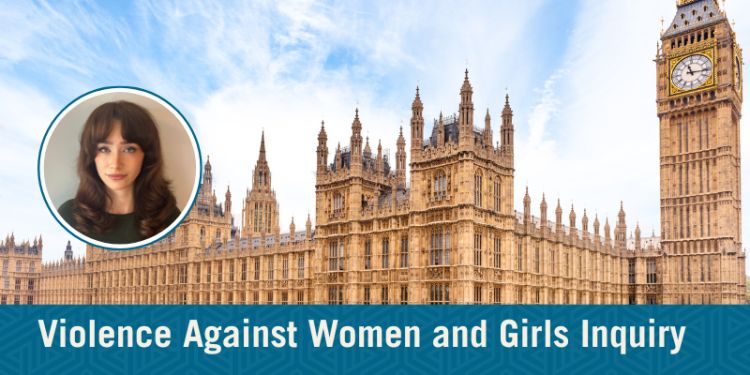Sophie de Groot addresses the abuse of adolescent girls in Government inquiry

Sophie de Groot has submitted written evidence to the Public Accounts Committee inquiry into Violence Against Women and Girls.
One in five women in their lifetime are estimated to be victims of sexual assault or attempted assault. One in twelve are reported to be victims of violence against women and girls (VAWG) annually. The true figure is likely to be much higher.
The Public Accounts Committee have been scrutinising Government efforts to tackle VAWG, following a damning report from the National Audit Office on the same issue. The inquiry invited written evidence from experts in this field, and Sophie de Groot answered the call.
Abuse of adolescent girls
Postgraduate researcher Sophie de Groot submitted evidence based on her research, which explored the perspectives of trusted adults on adolescent relationship violence. Key findings suggested that misogyny, both online and at school, is a key factor driving the abuse of adolescent girls by their intimate partners.
This was referenced particularly strongly in relation to the growth of the online ‘manosphere’, where social media personalities promote harmful ideas associating masculinity with physical strength, control, and superiority to girls. Whilst the abuse observed by participants was rarely physical, the data suggested that the normalisation of misogyny contributes to the adoption of harmful relationship behaviour, conflating control with love.
‘Protector’ vs ‘passive’ roles
Where adolescent boys are influenced to take on the ‘masculine protector’ role, this positions girls as inferior and passive, warranting control. Consequently, those interviewed explained how this leads to a lack of understanding regarding ‘what counts’ as sexual consent.
Participants felt that because misogyny is so normalised in secondary school environments, it is hard to know when to intervene. The research additionally highlighted that current educational resources aimed at preventing abuse do not accurately reflect the reality of young people’s intimate relationships, and young people should be provided with more agency to co-produce intervention materials.
Sophie de Groot gave five recommendations to ensure young people and schools have the skills to appropriately challenge misogyny:
-
Young people should be appropriately educated about misogyny and its role in driving harmful relationship behaviour.
-
Staff should be offered appropriate guidance on how to recognise and challenge misogyny at school.
-
Young people need greater education on appropriate online conduct within a relationship.
-
Young people should be educated on recognising and resisting online misogyny.
-
Resources aimed at challenging misogyny and harmful relationship behaviour should be co-produced with young people.
She says:
I am extremely grateful to have been able to share my research with the Public Accounts Committee inquiry on tackling VAWG. My hopes for the inquiry are that the government works collaboratively with young people, their parents and educators to challenge the misogyny that drives relationship abuse. Similarly, I hope that the government recognises the damaging impact of online misogyny and holds regulators accountable for tackling this. Equally, I think it is important to recognise that as individuals, we are all responsible for calling out harmful behaviour when we see it. Going forward, I hope my research continues to raise awareness about the abuse young people face all too often in their intimate relationships.
Sophie is a member of the Centre for Criminal Justice Studies. She is also a member of the Feminist Research into Violence and Abuse (FRIVA) network at the University of Leeds. FRIVA has over 50 academic members who work to improve the lives of women and marginalised groups.




